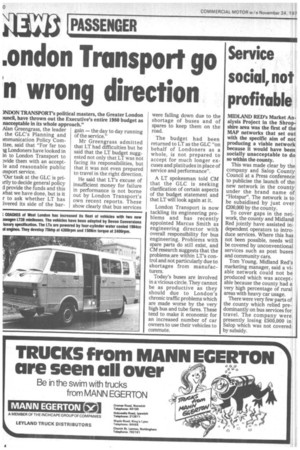.ondon Transport go n wrong direction
Page 22

If you've noticed an error in this article please click here to report it so we can fix it.
MON TRANSPORrs political masters, the Greater London iuncil, have thrown out the Executive's entire 1980 budget as nacceptable in its whole approach."
Alan Greengrass, the leader the GLC's Planning and immunication Policy Cornttee, said that "For far too ig Londoners have looked in in to London Transport to wide them with an acceptle and reasonable public Import service.
'Our task at the GLC is priLrily to decide general policy d provide the funds and this what we have done, but is it r to ask whether LT has ivered its side of the bar gain — the day to day running of the service."
Mr Greengrass admitted that LT had difficulties but he said that the LT budget suggested not only that LT was not facing its responsibilities, but that it was not even prepared to travel in the right direction.
He said that LT's excuse of insufficient money for failure in performance is not borne out by London Transport's own recent reports. These show clearly that bus services were falling down due to the shortage of buses and of spares to keep them on the road.
The budget had been returned to LT as the GLC "on behalf of Londoners as a whole, is not prepared to accept for much longer excuses and platitudes in place of service and performance".
A LT spokesman told CM that the GLC is seeking clarification of certain aspects of the budget statement and that LT will look again at it.
London Transport is now tackling its engineering problems and has recently appointed Marcus Smith as engineering director with overall responsibility for bus engineering. Problems with spare parts do still exist, and CM research suggests that the problems Are within LT's control and not particularly due to shortages from manufacturers.
Today's buses are involved in a vicious circle. They cannot be as productive as they should due to London's chronic traffic problems which are made worse by the very high bus and tube fares. These tend to make it economic for an increased number of car owners to use their vehicles to commute.








































































































































